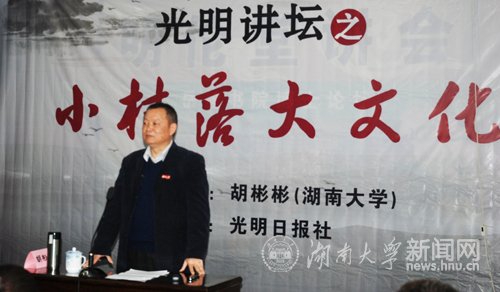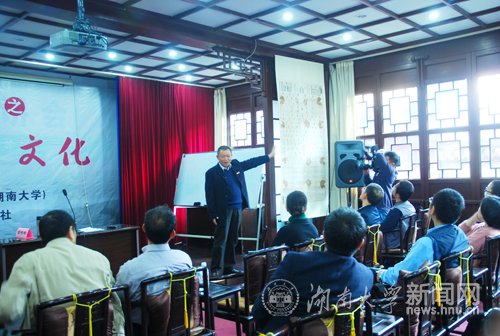
The Minglun Hall of Yuelu Academy welcomed its lecturer--Professor Hu Binbin on the afternoon of April 24th. Invited by the sponsor of “Guangming Lecture Room” —Guangming Daily, Professor Hu delivered a speech focusing on "Chinese Traditional Village and Its Cultural Connotation and Root".
He stated, villages, which were formed when ancestors lived in groups connected by clans during the agricultural civilization progress, are fundamental social units with certain scale and relative stability. Chinese traditional villages, as the foundation of traditional culture, boast diversified spatial forms, multiple cultural elements as well as rich and profound historical and cultural information.
Considering the richness and multiplicity of traditional village culture, especially the current situation of urbanization and new countryside construction during the period of social transition, Professor Hu put forward, village culture, the “root” of Chinese culture,must be well-protected. He also stressed that village culture, rooted in traditional society, contains lots of permanent valuable essence. And the concept of family, filial piety and nation in village culture is a good recipe for the loss of faith and moral decline in our society. It is of great significance to national cultural safety and social stability by protecting Chinese traditional villages effectively and having a systematic and intensive study of village culture.

It is learned that Professor Hu has a deep and unique study on Chinese village culture. Hunan University took the lead in establishing “Chinese Village Culture Research Center” in China in 2008 and listed it into the innovative platform of “985”. Walking nearly to every corner of the southwest of Hunan, Professor Hu has conducted full and accurate studies with his 17 research groups. Of 3,337 villages and towns in Hunan before administrative division reform, he has been 2,731 by foot. In the recent 30 years, he has walked through 29 provinces (cities) of China, to Sijiazi Man Minority Village in Heihe of Heilongjiang on the north, to Tuokuoyibashi Village in Jigen Town, Wuqia County of Xinjiang on the west and to Nanwan of Li’an Town in Li Minority Autonomous County of Lingshui in Hainan Province on the south. Professor Hu got first-hand data successfully, and his relevant collections as the material objects, documents and picture materials about Chinese countryside culture take the lead in our country.
